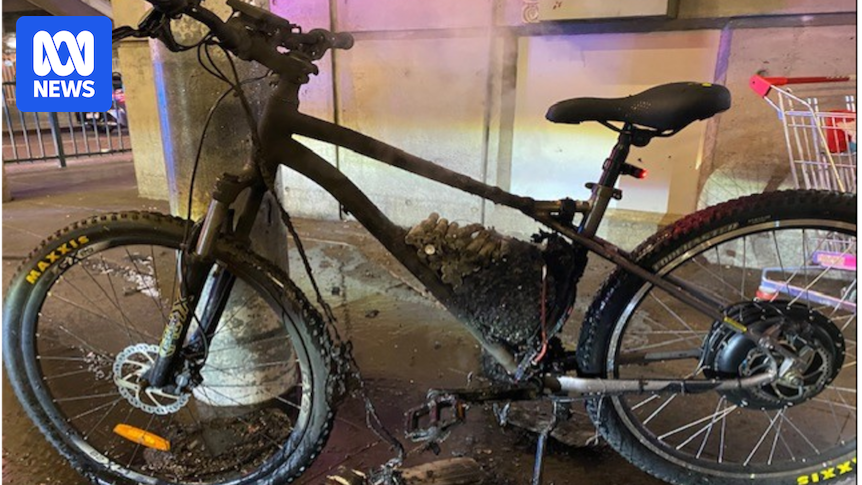E-bikes posing a “higher fire risk” will be banned from trains after dozens of incidents were found to be linked to the battery technology powering them.
Commuters travelling with a converted e-bike on a Sydney Train, Trainlink or Metro services, will face penalties of $400 to $1,110 from November 1.
The ban will only apply to converted e-bikes — a pedal bicycle fitted with an aftermarket battery and motor — and will apply on trains and platforms.
The NSW government said a fire at Blacktown Station in April involved a converted e-bike. (Supplied: NSW government)
The state government made the decision following discussions with stakeholders and a public consultation that yielded almost 3,000 responses.
“The overwhelming message from the consultation was that banning all e-bikes from trains would go too far,” Transport Minister John Graham said.
He said converted e-bikes posed greater fire risks, usually due to “DIY installations, inadequate wiring and the use of second-hand batteries, and incompatible or poor quality components”.
“Taking out the highest risk e-bikes is a sensible and balanced step, but we will watch this space very closely and take further action if necessary,” he said.
77 fires related to e-micromobility lithium-ion batteries
The lithium-ion batteries powering e-bikes and other electric “micromobility” devices have been linked to a spate of fires.
Fire and Rescue NSW said there have been 77 incidents so far this year, resulting in 16 injuries, but it could not provide more detailed data revealing how many were caused by converted e-bikes.
The state government made the decision following discussions with stakeholders. (ABC News: Abubakr Sajid)
According to the state government, two incidents were caused by e-bikes — one at Liverpool Station in August, and the other in a lift at Blacktown Station in April.
However, only the latter involved an e-bike that had been converted with an aftermarket kit.
Another e-bike fire reportedly occurred in Melbourne, on a metro train in March.
Bicycle NSW, a non-profit member group representing the state’s bicycle riders, said the policy represents a proportionate response.
“The real risk is with the kit-modified e-bikes,” chief executive Peter McLean said.
“It’s not just the lithium-ion batteries that are cheap, but it’s the wiring and the charging systems on them as well which pose a significant risk.”Battery in bin causes fire, 15 tonnes of rubbish dumped in street
Mr McLean acknowledged the policy could disproportionately affect people who couldn’t afford new e-bikes.
“It may be disadvantaging lower socio-economic users of bicycle riders, so there is a small chance of that.”
He said e-bikes had been available long enough to foster a second-hand market — and recommended budding riders buy well-known brands.
“It’s really, really important because these devices also provide a very, very significant benefit to many people across society … from food delivery to social connection to multimodal connection.”
Transport for NSW staff will be trained to enact the policy, the government said, and will “conduct hotspot blitzes” when it comes into effect in November.
Meanwhile, the state government is drafting legislation to improve the regulation of shared e-bikes.

